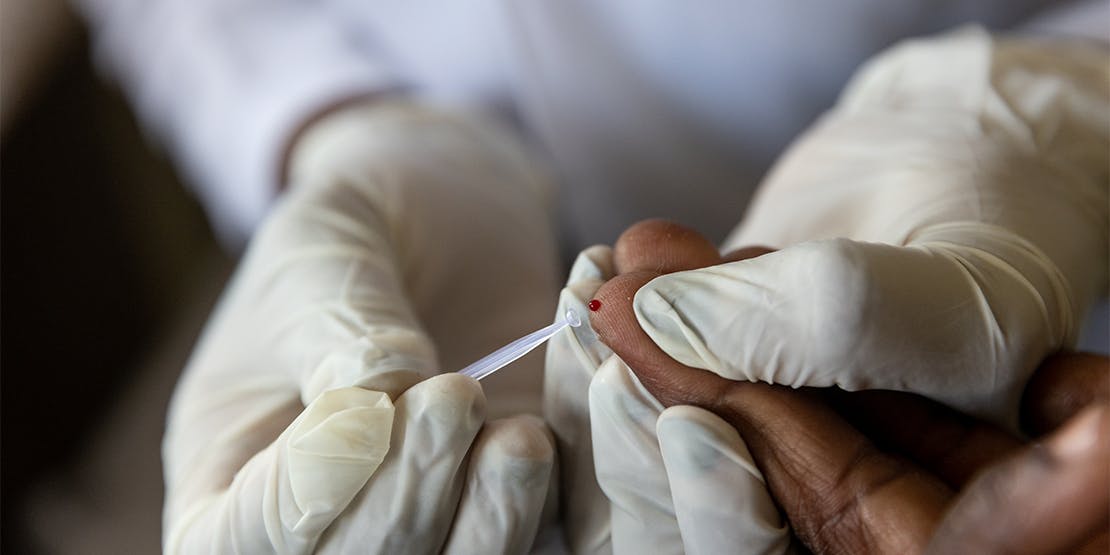IMPROVING ACCESS TO HIV MEDICINES
Our access to medicines strategy considers the specific challenges faced in terms of epidemic burden and economic status, and includes all low-income, least-developed, middle income and Sub-Saharan African countries (developing countries) where the unmet need for anti-retroviral therapy (ART) is greatest.

We recognise that no one category of stakeholder can successfully achieve universal access to HIV treatment and prevention methods alone and that stakeholders from all elements of society – government, Non-Governmental Organisations (NGOs) and the private sector - must work together to ensure that the Sustainable Development Goals (SDGs) are achieved and consequently that no people living (PLHIV) with or affected by HIV are left behind.
Our access to medicine commitments include:
- Investment in developing country clinical need-driven research and development and product registration strategies
- Innovative partnerships and solutions around patents and voluntary licensing
- New business models including flexible pricing models and local manufacturing partnerships
- Investment in healthcare and community capacity building activities which foster more effective healthcare service provision
Click for details about the worldwide registration status of Tivicay (dolutegravir) or Triumeq (abacavir/dolutegravir/lamivudine); and ongoing regulatory filings and registration of paediatric formulations of Tivicay (dolutegravir) 10mg and 25mg tablets and 5mg dispersible tablets, and Triumeq (abacavir/dolutegravir/lamivudine) dispersible tablet.
Click here for the worldwide registration details of Cabotegravir PrEP.
Click here for information on our commitment to voluntary licensing of Cabotegravir PrEP.
The issue
38 million people are eligible for ART under the ‘Treat All’ approach advocated by the World Health Organization (WHO) 2016 guidelines1. As of 2019 however, only around 67% of all PLHIV are accessing treatment2. Scaling up access to treatment and ensuring that all PLHIV have access to HIV medicines is a crucial part of the global response to the epidemic. Not only does sustained access to ART lead to better medical and psycho-social outcomes for PLHIV, there is now a growing body of evidence that shows that effective ART can act as a robust prevention (Treatment as Prevention [TasP]) method and may help halt the progression of the HIV epidemic3.
Access to medicine is complex and multifaceted. Pricing of medicines is important, but there are many other more significant barriers including healthcare resources, lack of clinics and hospitals, poor distribution networks, low numbers of trained healthcare providers, high levels of patient illiteracy, significant stigma and discrimination, and a lack of political will and inadequate prioritisation of HIV care in Government budgets.
Improving treatment and care for PLHIV presents a complex challenge to the global HIV community. It can only be addressed if the significant barriers are tackled as a shared responsibility by all sectors of global society - governments, international agencies, civil society, academic institutions, the pharmaceutical industry and others.
Our access to medicine policy
As a company 100% focused on the needs of PLHIV, making our medicines as widely available to patients regardless of income or where they live is central to both our access to medicines strategy and a core element of our corporate strategy.
We are committed to playing a full part in addressing the healthcare challenges surrounding HIV of the developing world by taking an innovative, responsible and, above all, sustainable approach. Our strategy to support the global response is informed by consultation with the global HIV community, in line with identified global health strategies, and supports the global HIV agenda and targets set by UNAIDS* as well as contributing to the achievement of the SDGs4.
- 1. WHO. Consolidated Guidelines on the Use of Antiretroviral Drugs for Treating and Preventing HIV Infection – Recommendations for a Public Health Approach (2016): http://apps.who.int/iris/bitstream/10665/208825/1/9789241549684_eng.pdf?ua=1. Last accessed April 2021
- 2. UNAIDS Fact Sheet 2019: FACT SHEET (unaids.org) https://embargo.unaids.org/static/files/uploaded_files/UNAIDS_WAD2019_FactSheet_en_em.pdf. Last accessed April 2021
- 3. WHO Prevent HIV, Test and Treat All 2016: http://apps.who.int/iris/bitstream/10665/251713/1/WHO-HIV-2016.24-eng.pdf?ua=1. Last accessed April 2021
- 4. United Nations Sustainable Development Goals: http://www.un.org/sustainabledevelopment/sustainable-development-goals/. Last accessed April 2021
NP-GBL-HVX-COCO-220053 October 2023
If you get any side effects, talk to your doctor, pharmacist or nurse. This includes any possible side effects not listed in the package leaflet. You can also report side effects directly via the Yellow Card Scheme at www.mhra.gov.uk/yellowcard or search for MHRA Yellowcard in the Google Play or Apple App store. By reporting side effects, you can help provide more information on the safety of this medicine.
If you are from outside the UK, you can report adverse events to GSK/ViiV by selecting your region and market, here.